
In today’s beauty landscape, the pursuit of eternal youth has given rise to a fascinating concept: ‘Slow-aging.’ This trend, gaining momentum among the younger MZ generation, diverges from the typical ‘anti-aging’ focus, instead embracing a more gradual approach to aging gracefully.
As we transcend conventional age boundaries, the interest in ‘Slow-aging’ intensifies, especially towards the end of each year when thoughts of turning a year older become prevalent. The allure of ‘Slow-aging’ isn’t merely restricted to dermatological treatments; it extends deeply into the realm of skincare products.
Let’s delve into the science behind skin aging. The signs of aging manifest in various skin layers – the epidermis, dermis, and subcutaneous fat. Epidermal aging exhibits as freckles, spots, and melasma, with timelines differing significantly from person to person. Conversely, changes in the dermis lead to a sense of reduced elasticity, commonly experienced within a similar age bracket.
Collagen and elastin fibers play pivotal roles in maintaining skin integrity. Collagen, constituting about 75% of the dermis, undergoes profound alterations with age. In younger skin, collagen fibers are well-connected, while in aged skin, they become fragmented, leading to reduced elasticity, wrinkles, and vulnerability to damage.
Elastin fibers, comprising about 4% of the dermis, contribute significantly to skin elasticity. UV exposure can severely damage these fibers, prompting a substantial focus on preventing such changes to delay skin aging.
Moreover, the skin contains enzymes like Matrix Metalloproteinase (MMP) that break down collagen. Recent attention has shifted towards preventing collagen degradation, with certain extracts displaying promising inhibition of this breakdown process.
One notable revelation from 2005 involved the application of 0.05% retinoic acid over six months, resulting in the regeneration of collagen and elastin fibers. Retinoic acid’s prowess in reducing pigmentation and boosting collagen production makes it a standout ingredient for ‘Slow-aging’ skincare routines.
Retinol, a well-known retinoid, continues to hold its ground in the cosmetic industry. Despite its long existence, retinol remains a potent ingredient, sold under various product names. Recent releases have spotlighted concentrated elasticity care products, aligning perfectly with the ‘Slow-aging’ trend.
However, caution is advised when using retinol due to its potential to irritate the skin. Gradual adaptation and combining it with a moisturizer can mitigate adverse effects, especially for those with sensitive skin.
In essence, ‘Slow-aging’ isn’t just a concept; it’s a comprehensive approach to skincare. Choosing suitable products and maintaining hydration and rest form the foundation for graceful aging.
Embracing ‘Slow-aging’ isn’t about defying time; it’s about aging gracefully, one step at a time.
For more information on how you can create your own ‘Slow-aging’ line of products, feel free to contact our manufacturing partner here!
#Anti-Aging #cosmeticingredient #slow-aging #well-aging #antiagingskincare #kbeauty
